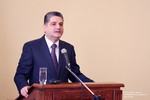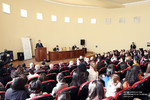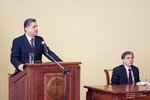Friday, 16 November 2012
PM Outlines Government Priorities and Reforms In Different Spheres
Prime Minister Tigran Sargsyan attended the 22nd edition of “National Economic Competitiveness Issues” scientific meeting at the State University of Economics.
Welcoming the participants, the Prime Minister presented the priorities of the reforms implemented by the government. “In the 21st century successful are those countries capable of appearing on the global market with new knowledge: transition from industrial society to a postindustrial one implies making a shift toward knowledge. We must create a knowledge-based society, on the other hand, to identify the competitive industry sectors that have a comparative advantage in the future and can develop the economy,” the Prime Minister stated.
This logic has been developed under the new export-oriented manufacturing industry policy, which the state has assumed an obligation not only to create a competitive business environment, but also with the private sector to develop and implement a sectoral industrial policy.
“Initiated and headed by the Prime Minister, a new platform is up for public-private sector partnership to identify the growth potential of various sectors. A number of arrangements have been signed to set out responsibilities and action plans for the public and private sectors in 2-3 branches of economy. Peculiar is the fact that the steps vary in different branches with no universal tools defined for all directions,” Tigran Sargsyan noted.
With reference to agriculture, the Premier said that the executive will be creating new jobs and increasing productivity through a new concept of development in agriculture. The chief objective behind the concept is to provide for better living conditions in the countryside so that farmers needn’t come to Yerevan in search of services. The Prime Minister said to be looking forward to having the young researchers’ contribution to the farm consolidation program.
According to Tigran Sargsyan, the government has made radical changes in the social sphere: the executive is now tackling the causes behind poverty and welfare problems rather than the effects.
“Poverty is caused by the lack of education and employment. Poor households have a very low level of education, because education is not affordable. The government is going to take care of their education so that poverty should not prevent the needy from getting education. The above rationale was set behind the reallocation of funds in the 2013 State budget bill. Additional sums will go toward the funding of educational programs, especially as intended for vulnerable households,” the Prime Minister said.
According to the Premier, the next task is to provide jobs for the socially vulnerable families. The Prime Minister noted that we are facing a difficult psychological situation when active people from poor families are not prepared to work, even though they can earn AMS100-120 thousand against the 30-50 thousand drams received in social benefits. “We have to overcome this psychological complex so that our citizens could work to make a living for their families,” the head of government emphasized.
Speaking of health care programs, the Prime Minister said that the existing funding model is not adequate to the challenges faced in this area. A working group has been established which as assisted by former British Health Minister Ara Darzi will develop a program of action to help increase the effectiveness of the new strategy. According to the Prime Minister, the problem is to develop more accurate methods of management rather than provide increased funding.
“Here the first step was to introduce a system of insurance. 114 thousand State employees were given the opportunity to insure their health, including heart surgery, which was previously out of reach for many of them. We increased by 30 thousand the number of those public servants eligible for this service. Our goal is to ensure that more accurate pricing policies are implemented in the health sector,” the head of government pointed out.
Down to research and education, the Prime Minister said a promising development model is out for this field. Universities should be the basis for the development of education and science in Armenia: “Competitiveness depends on the educational level. Universities should ensure that there is a link between science and industry in the person of serious research centers. All professors should be engaged in scientific activities. Universities ought to be the foundation of our society and we should make every effort to achieve this goal,” Tigran Sargsyan concluded.











